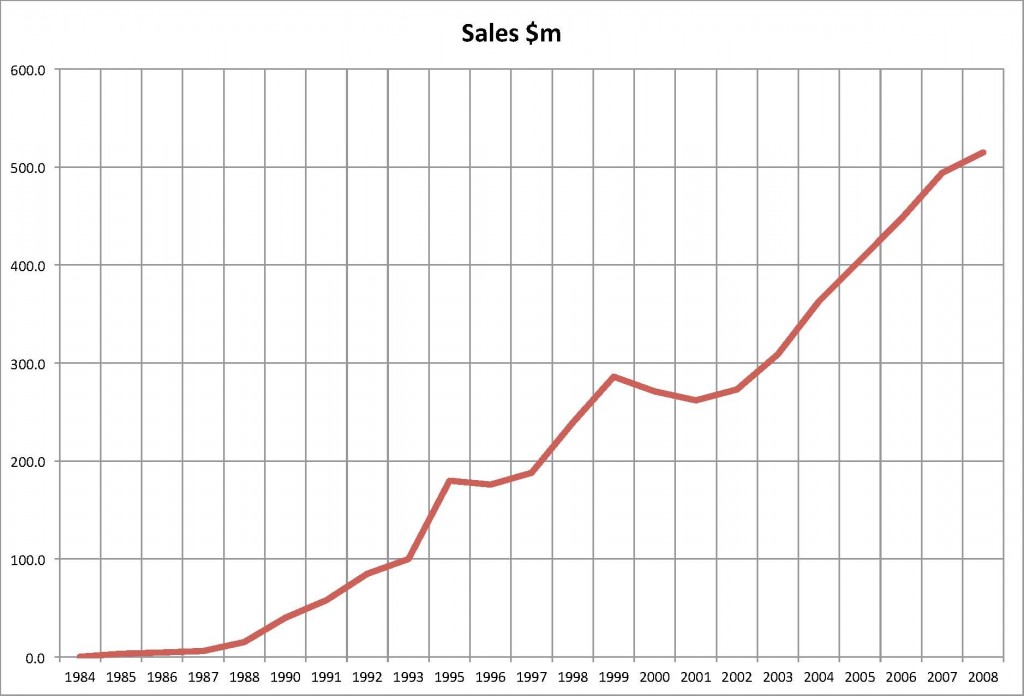Joe Alsop founded Progress Software in 1981. The first year of sales was 1984 at a few hundred thousand dollars. This is the graph of profitable sales that followed that first year, covering 25 years until he resigned in 2009 when sales were $515m and the market capitalization around $1.2Bn.
We chatted over a coffee on Tuesday morning and I asked him to make some observations about scaling private businesses. I guessed a man who had driven a software company in Massachusetts from zero to $515m would have a few pointers for us mere mortals.
- Over the years I’ve used some simple tools like “Real, Win, Worth” in evaluating new business opportunities:
- Is the product real?
- Is the market real?
- Can the product win in this market, what’s the competitive landscape look like?
- Can the company win, can I execute?
- How much can I make, is it worth it?
- Can I achieve my other objectives, what’s in it for everyone?
And my general observation is that “Win” is the challenging one to correctly assess. - When things are growing fast, staff are focused on beating the competition. But when slow down occurs, there is a tendency for people to compete internally with each other. Staff start looking for bigger challenges because their role has stalled. This needs to be managed.
- Along the same lines, as you scale businesses you need to be careful when personal success doesn’t equate to company success. Are you focused on the key issues to motivate this person?
- Another theme of scaling is what to do first. Many times I had to hold back sales directors who wanted to recruit sales staff before existing staff were exceeding their targets. Assuming your positioning is clear, it starts with product road maps, building products and services and then marketing, telling the story, building interest and leads. This pre sales activity needs to come first. Sales teams can then be brought into play and then customer support and operational build-out, which lag those initial activities. Clearly in the early days going from $100,000 to $4m you are scrambling to get things in place but the order matters in those early days.
- More than ever the line between the CEO and the CMO is very thin with respect to telling the story. In addition to the CEO, the CMO should be capable of seeking out where the profitable activities may exist.
- In addition the CEO needs to focus on talent development. Specifically with respect to high growth companies, some staff just can’t grow to the next stage. However bringing in senior staff to manage the growth needs to be handled with care. I have found that the person who isn’t capable of handing the step up might still be very capable of doing his original job to a high standard, and is actually relieved by the addition of new senior staff.
This is a huge subject so the observations above are just a few pointers. I will cover more detail in later posts. Interestingly I did a little analysis of the compound annual sales growth of Progress Software from 1984 to 2008.
- 1984 to 1991 (year Progress went public) – $300k to $58m – 112% CAGR
- 1991 to 2001 – $58m to $263m – 16.3% CAGR
- 2001 to 2008 – $263m to $515m – 10% CAGR
Remember any business growing at a CAGR of 25.9% will grow 10 times as big in 10 years.
The Key questions that emerged out of this discussion to help entrepreneurs scale their business:
Key Questions
- Is the market demand real? Is there an itch worth scratching?
- Can you build a product that can win?
- Are you managing the difficult transition from entrepreneurship to a professionally managed organization by establishing a solid management foundation thereby enabling scalability?
- Has your business outgrown key people and roles and what’s your solution?
- Are you waiting too long to hire?
- Are your lack of metrics and relevant systems holding back your ability to recognize profitable opportunities?
- As the founder can you recruit talent to complement your skills, can your ego take it?
- Are your efforts aligned around scaling aggressively but safely?
I’ll dive deeper into some of these issues in the next few months. I believe a lack of understanding of how to scale is holding back entrepreneurship by preventing owners from fulfilling the potential of their businesses.








